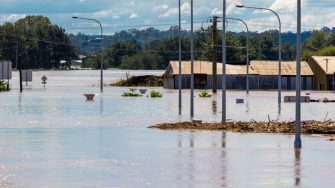
“Trying and making a small difference is always better than doing nothing at all.”
ENGG4103 is a 6UoC UNSW Engineering undergraduate course. It requires students to use reflective learning practices, present critical thinking and problem-solving skills, as well as appreciate the importance and value of ethical practice. It is a collaborative course that runs in conjunction with RedR Australia, an international humanitarian response agency that selects, trains, and deploys technical specialists to operate with on-the-ground partners at humanitarian crisis sites. RedR Australia is the only United Nations Standby Partner in the Southern Hemisphere to support UN response efforts,
ENGG4103 differs from other UNSW Humanitarian Engineering courses in that it focuses primarily on disaster response as opposed to building resiliency, and as such trains to students to recognise the importance of timely organisation and decision making. Students will be encouraged to apply their engineering skills and abilities to dynamic environments whose needs are imperative.
Dr. Andrew Dansie, Senior Lecturer in Humanitarian Engineering, School of Civil and Environmental Engineering and Academic Lead, Humanitarian Engineering in the Faculty of Engineering, says that “being able to have our UNSW students attend RedR Australia’s Essentials of Humanitarian Practice course as part of their degree is tremendous.
“Students get real world, hands-on experience in international humanitarian activities and get to be a part of the broader humanitarian community.”
In Term Three 2021, students from ENGG4103 participated in RedR Australia’s Essentials of Humanitarian Practice (EHP) course held between 9th-15th of November at the Victorian Emergency Management Institute (VEMI).
Dr James Hayes, Course Co-ordinator for ENGG4103, says the course EHP provides students with an enhanced understanding of humanitarian action, how the humanitarian system works, the ethical underpinnings of the humanitarian system, and how this applies to on-the-ground efforts.
“More than ever,” he says, “humanitarian work needs the expertise of engineers, but conversely engineers need to understand the ways in which humanitarian action operates. “
Certainly, the 2021 student participants were very impressed.
Cordelia Rentsch – BE Hons - Civil Engineering
“I would highly recommend that anyone interested in learning more about humanitarian engineering to take ENGG4103 and attend RedR's Essentials of Humanitarian Practice course. These two courses will provide you with an understanding of what it takes to be a humanitarian engineer and set you up to be a competitive graduate.
“During ENGG4103, you will learn the skills and theory required to respond to humanitarian disasters and have the chance to put these to the test in "real-world" assessment tasks.
“RedR's course will expand upon what you learned in ENGG4103, give you the opportunity to meet inspiring career humanitarians and expand your professional network. While you may feel challenged at times, these courses are rewarding and fun, offering a unique way of learning that doesn't solely rely on textbooks and exams.”
Eliza Falkenmire, BE Hons - Mechanical Engineering
“I can genuinely say that the RedR course I attended as part of this class is one of the most valuable experiences I have had in my engineering degree at UNSW.
“This course and ENGG4103 was the first time I learned how I can use my knowledge and skills to help those in a humanitarian crisis.”
Kate Alderman, BE Hons - Renewable Energy
“4103 gave me a solid introduction to the humanitarian context, which was further enriched by the RedR course. The practical and collaborative learning taught me so much about myself and others in a short amount of time, and inspired me to pursue my love for working in a humanitarian space.
“I learned to not let seemingly impossible challenges daunt me, but rather to use them as an opportunity to do the best I can. Trying and making a small difference is always better than doing nothing at all.
“The tools used by RedR help us to start somewhere with wicked problems. Learning about them in 4103 meant that we weren't seeing them for the first time once we went on the course. I found myself spending less time worrying about new material and more time applying skills I already had in a realistic environment.
“We can't solve every crisis in the world, but even changing the lives of one family is worth our time.”
